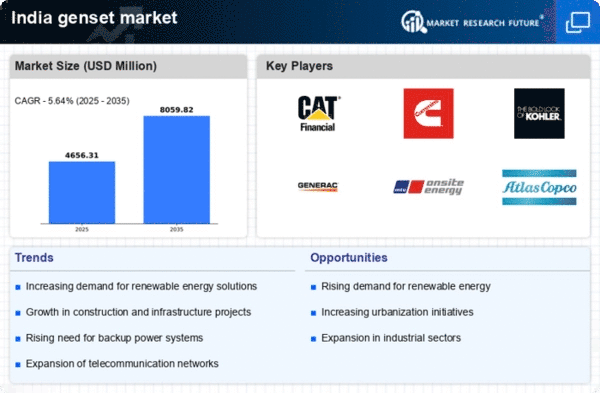Rising Energy Costs
The escalating costs of energy in India are propelling the genset market forward. As electricity tariffs continue to rise, businesses and households are increasingly seeking alternative power solutions to manage expenses. The average electricity price in India has seen an increase of approximately 10% over the past year, prompting consumers to consider gensets as a cost-effective option. This trend is particularly evident in sectors such as agriculture and small-scale industries, where power reliability is crucial. The genset market is likely to benefit from this shift, as consumers prioritize affordability and efficiency in their energy consumption. Furthermore, the potential for savings on energy bills may encourage more investments in genset technology.
Increasing Industrialization
The rapid pace of industrialization in India is a primary driver for the genset market. As industries expand, the demand for reliable power sources intensifies. Manufacturing sectors, particularly in automotive, textiles, and pharmaceuticals, are increasingly reliant on gensets to ensure uninterrupted operations. In 2025, the industrial sector is projected to contribute approximately 30% to India's GDP, further amplifying the need for backup power solutions. This trend indicates a robust growth trajectory for the genset market, as businesses seek to mitigate risks associated with power outages. Additionally, the government's initiatives to boost manufacturing under the Make in India program are likely to enhance the demand for gensets, as companies prioritize operational efficiency and reliability.
Government Policies and Incentives
Government policies and incentives play a crucial role in shaping the genset market in India. Initiatives aimed at promoting energy security and sustainability are likely to enhance the adoption of gensets across various sectors. The government's focus on reducing carbon emissions and promoting cleaner energy sources may lead to incentives for using hybrid or renewable gensets. Additionally, policies supporting the manufacturing sector, such as tax breaks and subsidies, could stimulate growth in the genset market. As the government continues to prioritize energy independence, the genset market is expected to experience increased demand, driven by favorable regulatory frameworks and financial support.
Technological Innovations in Gensets
Technological innovations are transforming the genset market in India, enhancing efficiency and performance. Advances in engine technology, fuel efficiency, and emissions control are making modern gensets more appealing to consumers. The introduction of smart gensets, equipped with IoT capabilities, allows for remote monitoring and management, which is particularly attractive to businesses seeking operational efficiency. In 2025, the market for smart gensets is projected to grow by 15%, reflecting the increasing demand for advanced power solutions. These innovations not only improve reliability but also align with the growing emphasis on sustainability, positioning the genset market favorably in a competitive landscape.
Urbanization and Infrastructure Development
India's ongoing urbanization and infrastructure development are pivotal factors influencing the genset market. With urban populations expected to reach 600 million by 2031, the demand for power in urban areas is surging. Infrastructure projects, including smart cities and transportation networks, necessitate reliable power sources, thereby driving the genset market. The government has allocated substantial funds for infrastructure development, which is anticipated to exceed $1 trillion by 2025. This investment is likely to create a favorable environment for genset manufacturers, as construction sites and urban facilities require consistent power supply. Consequently, the genset market is poised for growth, catering to the needs of a rapidly urbanizing population.
















